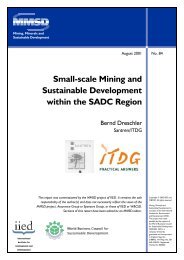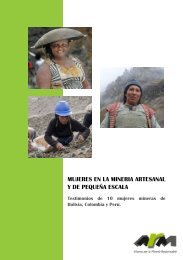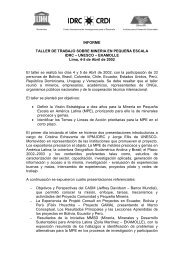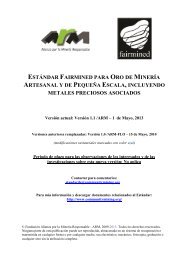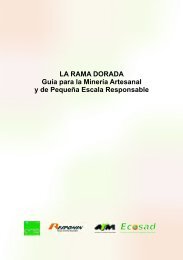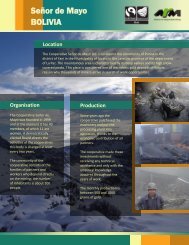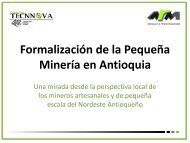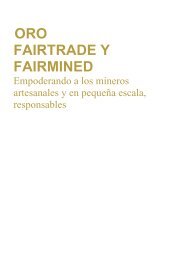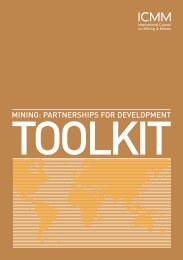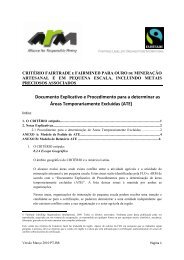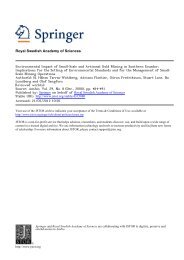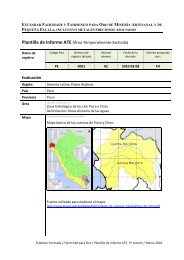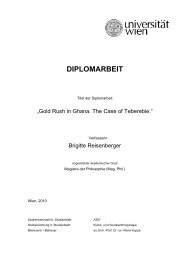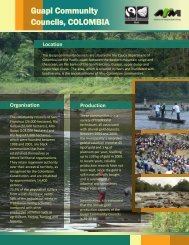A Poisonous Mix - Human Rights Watch
A Poisonous Mix - Human Rights Watch
A Poisonous Mix - Human Rights Watch
You also want an ePaper? Increase the reach of your titles
YUMPU automatically turns print PDFs into web optimized ePapers that Google loves.
Regional and International Initiatives towards Mining Businesses<br />
The Extractive Industries Transparency Initiative (EITI) in Mali<br />
In August 2011, Mali became a member of the Extractive Industries Transparency Initiative<br />
(EITI). 393 EITI is a voluntary global initiative that requires its members to disclose<br />
information about oil, mining and gas company payments to governments. It brings<br />
together governments, companies, and civil society. Countries who apply to become EITI<br />
members have to undergo a process of validation. 394<br />
EITI is almost entirely focused on the obligations of governments and of international oil,<br />
mining, and gas companies, and gives little attention to national and international companies<br />
trading in gold from artisanal mines. Nevertheless, by committing to transparency standards<br />
in the large-scale mining sector, the Malian government has established an important<br />
principle that could be extended to the artisanal mining sector in the future.<br />
Civil Society Action on the Mining Sector in Mali<br />
Most Malian civil society groups working on mining focus on the large-scale mining sector.<br />
They monitor and document the conduct of the government and large-scale mining<br />
companies with regards to transparency, environmental impacts, and benefit for the local<br />
population. NGOs provide an important counter-perspective to the government, for<br />
example, by submitting a shadow report on the government to EITI or by documenting the<br />
environmental damage caused by mining companies. 395<br />
Occasionally, civil society groups also work on artisanal mining. Fondation pour le<br />
Développement du Sahel, one of the leading NGOs in this area, has carried out a small<br />
study on mercury use in Kangaba. 396<br />
West African Common Mining Policy and Mining Code<br />
At the regional level, the Economic Community of West African States (ECOWAS) adopted a<br />
directive on mining in 2009, and is about to adopt a mining policy in 2011. A legally<br />
393 Extractive Industries Transparency Initiative (EITI), “Mali,” January 10, 2011, http://eiti.org/node/74 (accessed August 11, 2011).<br />
394 EITI, “What is the EITI,” http://eiti.org/ (accessed August 10, 2011). Companies can also commit to the EITI standard,<br />
though there is no similar validation process. AngloGold Ashanti and Gold Fields are two international gold companies with<br />
operations in Mali who have committed to the EITI standard.<br />
395 <strong>Human</strong> <strong>Rights</strong> <strong>Watch</strong> interview with Aliou Haidara, Publish What You Pay, Mali, Bamako, February 16, 2011; <strong>Human</strong> <strong>Rights</strong><br />
<strong>Watch</strong> interview with Tiémoko Sangare, Fondation pour le Développement du Sahel, Bamako, April 6, 2011.<br />
396 Fondation pour le Développement du Sahel (FDS), “Etude sur le mercure,” November 2010.<br />
79 HUMAN RIGHTS WATCH | DECEMBER 2011



